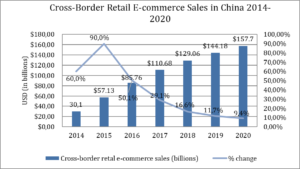The Future of the Online Chinese Market

The Future of the Online Chinese Market
In our last E-commerce article in the tetralogy of E-commerce insights, we look into the Future of the Online Chinese Market. Here we dive into what will happen in this market with seemingly unlimited potential. This article will be about the trends of China e-commerce and how foreign brands can exploit the upcoming growth. The future looks bright for foreign companies entering on the Chinese online market. Interested in the other articles, click to read the first, second and third article, or request our white paper:
Chinese buyers have been buying more and more products outside of China, but why? For these consumers it might be just personal preference, wanting foreign brands or health considerations. In the eyes of these consumers, foreign companies have the products that match their requirements. Many of the foreign products bought by the Chinese are through e-commerce. In 2015 alone cross-border sales in China was an estimated $40 billion, which was over 6% of the total e-commerce in China. This number will only be growing over the coming years, currently upward at a rate of 50%.
Market Size and Customer Segment
One key factor for companies entering a new market is the market size. The cross-border retail e-commerce sales in China totalled $30.07 billion in 2014, and after two years of 60% and 90% growth, in 2016 the growth retail e-commerce sales reached over $85 billion (Figure).
In 2014, there were an expected 74.6 million cross-border buyers in China, whereas in 2016 that number has reached 181.2 million cross-border buyers. This amount is expected to rise as more Chinese people become online users and mobile devices become an even large part of online user’s daily life.
People that purchased goods between borders were, estimated, 65% male, and 75% of all buyers are between the 26 and 40 years old. Often, these buyers are highly educated and have an income above about $1470 (10,000 RMB) per month. Only 75% of buyers purchase products less than once a month. 56% of the products purchased are valued between the about $15 to $75 (100 to 500 RMB). Another interesting detail is that most of the people buying products live in southeast China, with 25% of the buyers living in Guangdong and Shanghai.
For foreign companies entering the China e-commerce these numbers and statistics are important to know, as not all customers are the same. The amount of cross border customers will only be getting larger, but to fully capitalize on this the right customer needs to be targeted.
Why do Chinese Consumers Want Foreign Goods and Buy it Online?
Understanding the customer is crucial to increase sales. It is therefore very important to know why exactly foreign goods are in demand in China and which of your products can become more successful than others on the digital marketplace.
- 61% of the cross border purchasers say that they buy their products based on quality guarantees. Quality is very important to Chinese consumers when buying foreign products. Furthermore, products that have a guarantee are especially attractive to consumers
- 59% buy products based on low prices. While there may be a misconception that many foreign products are more expensive to purchase, Chinese consumers are finding ways to buy these products on online platforms at affordable prices
- 52% buy products because the product is not available in China. Som or the large online platforms give Chinese consumers access to foreign products; otherwise these products would not be available for legal purchase in China
- 46% buy products due to brand preferences. For some Chinese consumers, brand name recognition is very important whey they buy foreign products which greatly influences the buying habits
If these reasons continue to increase among Chinese consumers online, then foreign companies should make a business plan to reach this large consumer group. Chinese people order products online due to the faith they have in digital purchases. As research above highlights, 61% of the buyers purchase products from abroad because there is a guaranteed quality. On online platforms like Taobao, there is distrust between sellers and buyers. The issue with this platform was that products in reality looked different from how they were presented on the pictures posted by the sellers. Cross-border products, on the other hand, have yielded accountability from sellers to their buyers to deliver the product displayed due to strong control on false advertising.
However, this does not mean that all companies selling on Taobao are dishonest to their customers. For individual foreign sellers and companies starting up, selling on Taobao and Microboss while focusing on selling quality products, can build an excellent seller-consumer rapport. This can help in the future if the company becomes larger and successful enough to sell on B2C online platforms like JD and Tmall because consumers will already recognize the company and buy from them again.
Why Should Foreign Companies get into China Cross-Border Sales?
Chinese consumers want to buy products that come outside of China. Companies in China do not yet provide the same quality products that foreign companies are offering. This is giving Chinese consumers more incentive to buy from companies abroad. It is possible for a company to enter the market and get paid in the currency of their choice. Payment platforms like WeChat pay and Alipay have cross-border payment options, so non-Chinese companies can sell to Chinese consumers and receive payment in their currency in real time.
Besides this, there will be a new incentive for companies to enter China: the One Belt One Road Initiative. The agreement between the Chinese government and other governments in Asia, Europe, and Africa. This initiative will be an opportunity to develop economic ties between countries. Bringing in more B2C companies and other smaller businesses to China will further strengthen these economic ties between countries through cross-border purchasing. The Chinese government is actively looking for foreign companies that want to bring their products via this avenue.
To fully exploit what the digital marketplace in China has to offer, it is wise to find out how to market, who to market to, where to market, and when to market. Doing this will exponentially help the chances of non-Chinese companies to be part of the growing group that found success with cross-border sales.
We hope you enjoyed our E-commerce series. Should you have any questions about YOUR company’s opportunities with China E-commerce, please contact us at info@1421.consulting. No strings attached, we would be happy to answer your questions.
This article was written by Maxime Van ‘t Klooster and Nathan Jansen. Special thanks goes out to Ruoyi Xi. For more information, please request our China E-commerce White Paper.
Related posts



